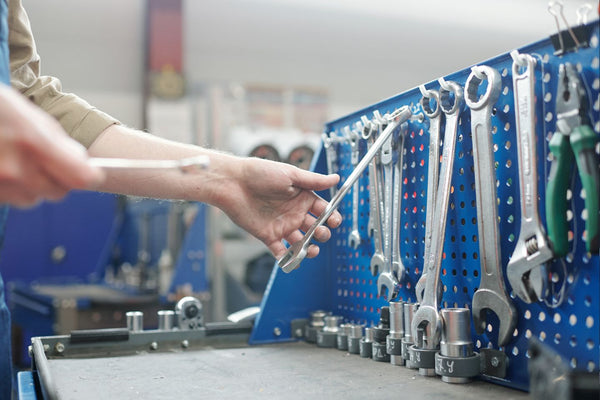The Ultimate Hand Tool Guide for Every Homeowner

Jump to:
Hand tools are the backbone of every toolbox, whether for simple household fixes, detailed woodworking, or professional projects. Unlike power tools, they don’t rely on electricity or batteries, making them dependable, versatile, and essential for precision work.
This complete guide covers everything you need to know about hand tools, from understanding their role and comparing them with power tools, to choosing the best brands, building your first toolkit, and maintaining them for long-lasting use.
We’ll also highlight some of the best hand tool brands like KTC, Vessel, Fujiya, Tone, Deen, and Engineer, known for their durability, precision, and ergonomic designs, trusted by both professionals and beginners.
Types of Hand Tools

Hand tools are essential for tasks that require precision, offering users the ability to exert controlled force and make fine adjustments.
Hammers – Used for driving nails, breaking materials, and general construction tasks.
Screwdrivers – For installing or removing screws; available in flathead, Phillips, and other specialized types.
Pliers – Ideal for gripping, bending, and manipulating wires or small objects.
Wrenches – Used to tighten or loosen bolts and nuts; includes adjustable and socket varieties.
Saws – Designed for cutting wood, metal, or other materials; hand saws provide precision and control.
Chisels – For carving, shaping, or removing material from wood, metal, or stone.
Tape Measures – Essential for accurate measurements in woodworking, construction, and repairs.
What Are The Best Hand Tool Brands?

Choosing high-quality hand tools is key for both professionals and DIY enthusiasts. The right brand ensures durability, precision, and comfort, making your projects easier and safer. Here are some of the top hand tool brands you should consider:
Deen – Known for rugged, long-lasting tools, trusted by professionals who value meticulous craftsmanship and attention to detail.
Tone – Offers a wide range of high-performance wrenches, sockets, and hand tools with precision engineering and ergonomic design, especially for automotive and industrial use.
KTC (Kyoto Tool Company) – Famous for strength and innovation, particularly in sockets and wrenches, delivering reliable performance under heavy-duty conditions.
Vessel – Celebrated for screwdrivers and precision instruments, designed with superior ergonomics and tailored solutions for both DIYers and professionals.
Fujiya – Renowned for advanced pliers, snips, and scissors that provide excellent grip, durability, and versatility for both general maintenance and intricate tasks.
Engineer – Specializes in finely crafted precision tools such as pliers, screwdrivers, and tweezers, making them ideal for delicate and detailed work.
Check out this article for a list of the best hand tool brands.
Choosing The Right Tool Set

Selecting the right hand tool set depends on your specific needs, whether for home repairs, automotive work, or woodworking.
For general household tasks, a versatile set with essentials like screwdrivers, pliers, an adjustable wrench, hammer, tape measure, and utility knife will cover everything from hanging shelves to fixing loose fixtures.
For automotive repairs, focus on a set that includes a variety of sockets (both metric and imperial), ratchets, torque wrenches, hex keys, and pliers. Durability is key; choose tools made from chrome vanadium steel with corrosion-resistant coatings and ergonomic handles to handle high torque and frequent use.
When it comes to woodworking, precision is vital. A good set should include chisels, hand saws, a mallet, clamps, measuring tools, and a block plane to enable precise shaping, joining, and finishing of wood.
No matter the category, opt for sets from well-known brands renowned for their quality and reliability. Pay attention to tool ergonomics, particularly if you’ll be using them for extended periods. Consider storage options as well. Sturdy cases or tool rolls will help keep everything organized and protected.
Lastly, choose a set that meets your current needs while leaving room for future expansion as your skills grow. Investing in the right set enhances both efficiency and safety, providing long-lasting satisfaction across various tasks.
Hand Tools Vs Power Tools

Hand tools and power tools each offer distinct advantages, making them suitable for different types of tasks.
Hand tools are best suited for precision work, providing superior control and finesse, especially in delicate applications such as fine woodworking, detailed repairs, or careful assembly. Their quiet operation, portability, and lack of reliance on a power source make them ideal for smaller-scale jobs where accuracy is paramount. They’re also generally more affordable and easier to maintain.
In contrast, power tools are engineered for speed and efficiency, excelling in demanding tasks that require high force or repetitive motion. Whether it’s drilling through dense materials, cutting large surfaces, or driving fasteners quickly, power tools are indispensable in construction, major home renovations, and automotive work. However, their power can be excessive for intricate tasks and they often require more upkeep, including battery management or corded setups.
In a nutshell:
|
Feature / Strength |
Hand Tools |
Power Tools |
|
Best for |
Precision work, detailed tasks |
Speed, efficiency, heavy-duty tasks |
|
Control |
Superior control and finesse |
Less precise, more forceful |
|
Cost |
Generally more affordable |
Usually more expensive |
|
Maintenance |
Easier to maintain |
Requires more upkeep (batteries, cords) |
|
Portability |
Highly portable, no power needed |
Less portable, often requires power |
|
Noise |
Quiet operation |
Can be loud |
|
Ideal Use |
Fine woodworking, small repairs, assembly |
Construction, renovations, automotive |
Choosing between hand tools and power tools ultimately comes down to the nature of the project, its scale, complexity, and the level of precision required, as well as your working environment and personal preferences. For many professionals and DIY enthusiasts, a balanced toolkit that incorporates both types ensures flexibility and readiness across a wide range of tasks.
What Are The Safety Basics?

Safety with hand tools starts with thorough preparation and situational awareness. Key precautions include:
Wear well-fitting clothing – Loose sleeves, dangling jewelry, or accessories can become entangled in moving parts or snag on sharp edges, posing a serious risk.
Foot protection – Opt for sturdy, closed-toe shoes.
Work gloves – Can enhance grip and help prevent cuts or abrasions, provided they do not compromise your control of the tool.
Eye protection – Safety glasses or goggles shield against flying debris, wood splinters, and accidental tool slips.
Maintain a clean workspace – Ensure your workspace is well-lit, clean, and organized to minimize tripping hazards and facilitate safe tool handling.
Check tool condition – Damaged or worn tools, such as chisels with chipped edges or screwdrivers with stripped tips, can slip unexpectedly and cause injury.
Tool maintenance – Keep blades sharp, handles intact, and moving parts properly lubricated. Store tools securely when not in use.
Proper usage – Always select the appropriate tool for the task and apply force with control, directing motion away from your body whenever possible.
By combining suitable attire, protective equipment, and diligent tool maintenance, you can greatly reduce the risk of injury when working with hand tools.
Cleaning And Storing Tools To Make Them Last

Regular cleaning and proper storage of hand tools are essential for preserving their functionality and ensuring safe use.
After each project, thoroughly wipe down tools to remove dirt, dust, and moisture as these elements can lead to rust, corrosion, and premature wear.
For metal components, applying a light coat of machine oil or a rust-preventive solution helps guard against oxidation, particularly in humid conditions.
Wooden handles benefit from occasional treatment with linseed oil to prevent drying, splitting, or cracking.
Before storing, inspect each tool carefully. Clear debris from joints, hinges, and cutting edges, and sharpen blades as needed to keep them ready for future tasks.
Storage conditions matter: choose a dry, well-ventilated area, shielded from direct sunlight and temperature extremes. Use toolboxes, pegboards, or compartmentalized drawers to keep tools organized and prevent damage from contact or impact.
For precision instruments or fine woodworking tools, consider additional protection such as tool rolls, blade guards, or padded cases.
By consistently cleaning and storing your tools with care, you not only extend their service life but also maintain their safety and reliability, saving time, reducing risk, and avoiding unnecessary replacement costs.
Tips For Beginners Building Their First Tool Collection

When assembling your first set of hand tools, begin with a compact selection of versatile, high-quality essentials tailored to the types of projects you intend to undertake.
For general home maintenance, a foundational kit might include a hammer, flathead and Phillips screwdrivers, pliers, an adjustable wrench, a tape measure, a utility knife, and a spirit level.
Prioritize quality over quantity; durable, well-crafted tools not only perform more reliably but also enhance safety and longevity compared to inexpensive alternatives. Avoid purchasing highly specialized tools until a specific need arises. Take time to learn proper usage techniques for each tool; incorrect handling can lead to damage or personal injury.
Ergonomics matter. Choose tools with comfortable grips and balanced weight to reduce fatigue and improve precision. From the outset, keep your collection organized using a toolbox, pegboard, or wall-mounted system to ensure easy access and maintain tool condition.
Expand your toolkit gradually as your experience grows, selecting each new item based on actual project demands. This deliberate approach fosters familiarity with each tool’s function and care, resulting in a well-rounded, durable collection that aligns with your evolving skill set and working style.
Master Home Repairs with the Right Hand Tools
Grasping the basics of hand tools is key to ensuring safe, efficient, and rewarding work. From choosing quality essentials to maintaining them properly, every decision enhances your ability and confidence in home improvement, repairs, and craftsmanship.
By investing in dependable tools, prioritizing safety, and thoughtfully growing your collection, you set the stage for a lifetime of practical skills and independence. With the right tools, every project becomes a chance to learn, create, and take pride in your accomplishments.
What hand tools do you most rely on? Let us know in the comments.

2 comments
Thank you so much for your kind words! We’re really glad to hear that you enjoyed browsing Daitool and found our products easy to explore. Your feedback means a lot to us.
We hope you continue to discover tools and essentials that help with your projects!
Daitool,
Superb website! The range of products is diverse and well-organized. Browsing for gadgets and lifestyle essentials is really easy.
ayzalcorporation,